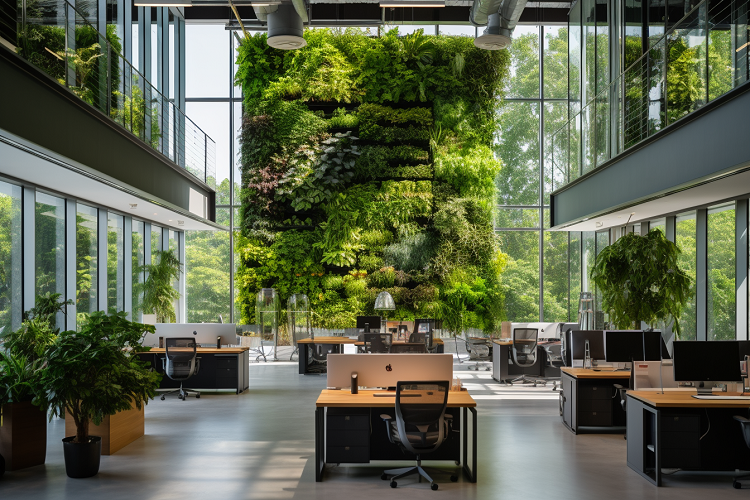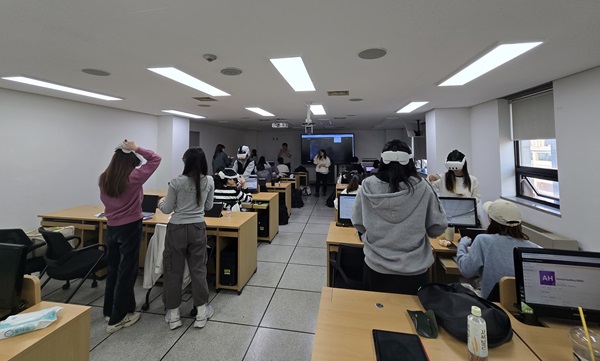The office was a regular part of everyday life just a few years ago, but is it still relevant to today’s workplace? While more companies have turned to flexible and hybrid working policies in the wake of the pandemic, Google Trends data shows that the office is just as popular as it ever was.
June 2023 searches for ‘office space’ were almost on par with the number of searches back in 2019, a good nine months before the pandemic even began. But that’s not to say that we’re still looking for the same kind of office space as we were back in 2019.
Over the past couple of years, the way we think about work has shifted and that means our office spaces have altered too. Here, the experts from commercial and office estate agency Making Moves share the five office trends that are shaping the future of the workplace, featuring AI imagery showing how these trends might manifest in those spaces.
Smart offices
The future is AI — even in the office. Smart offices use innovative technology to optimise and improve the workflow and experience in an office space, and although we’re only just starting to see this trend emerge, it’s growing in popularity as tech-savvy Millennials and Gen Zers start to dominate the workplace. In fact, Google UK searches for ‘smart office’ were up 85% from June 2019 to 2023 as the trend begins to take hold.
Expect to see more smart tech enter the work sphere in the coming years, with solutions like interactive office maps, QR code keycards, desk booking apps, and colleague-finding software. These technologies will help to streamline small tasks in the working day, helping to make staff more efficient and productive, and the rise of smart workplace analytics means business leaders can analyse how their office is being used to further optimise the space.
More shared co-working spaces
The rise of hybrid working models and the desire to downsize has opened up the opportunity for more co-working spaces (also called shared spaces). Co-working spaces existed pre-pandemic but are now more popular than ever as the need for smaller, more flexible spaces grows. In fact, by June 2023, Google UK searches for ‘shared office space’ were up 129% from the same date in 2019.
The need for adaptable working spaces extends beyond shared offices, too, with more companies and business owners looking for flexible rental options such as daily rates. Whether it’s to book a quiet meeting space or rent a desk now and then, more accommodating letting options are entering the rental sphere.
Commute-worthy offices
In 2023 and beyond, a healthy work-life balance will be a major focus, which means the office space needs to become more than just a place to work. Employers are now looking for ways to maintain morale and ensure staff feel excited about coming into the office each day by offering extra amenities such as a gym, game room, or yoga studio.
In March 2023, Google searches for ‘office with gym’ reached their highest point in the last five years as workers look for a place to unwind in their lunch break or at the end of the day. Some businesses are transforming their spare space into sociable or wellness areas, while others are choosing their office location more carefully — it’s all about making the office worth the commute.
These amenities aren’t just superfluous perks either. Having the space to relax and enjoy hobbies at the office can improve workplace wellbeing, efficiency, and staff retention, as well as being a magnet for new talent, which is incredibly useful in a tight labour market.
Fewer workers mean smaller spaces
The rise of hybrid working means many businesses have found that their existing office space is simply too big for their needs. Companies are now looking to reduce their square footage to find smaller but better workspaces for their team. As of June 2023, Google searches for ‘small office spaces for rent near me’ and other relative terms receive a combined 7,500 searches per month (according to search data from Ahrefs).
Moving to a smaller workspace has a whole range of benefits for business leaders, from saving money to reducing energy usage. The money saved also allows brands to find better workspaces that more closely suit their needs.
Biophilic workspaces
While today’s offices may have a few small desk plants here and there, the future of the office space will inject even more greenery into the workplace. Google UK searches for ‘biophilic design’ generally receive around 1,800 searches per month, according to Ahrefs data, as designers look for more ways to bring the outside in.
The benefits of indoor plants include increased happiness and reduced stress levels, which can boost productivity, creativity, and concentration. So, it’s natural that biophilic architecture and design was going to enter the workplace. Office designers are already becoming more interested in aspects such as green walls, indoor trees, and even garden spaces, to make the office feel less clinical and more organic.
Commercial and office estate agency Making Moves – www.makingmoveslondon.co.uk







